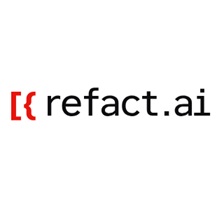Agentic AI Comparison:
Cognition Devin AI vs Refact.ai
Introduction
This report presents a detailed comparison between Refact.ai and Cognition Devin AI on the metrics of autonomy, ease of use, flexibility, cost, and popularity. Both tools represent advanced AI coding agents but differ significantly in design philosophy, deployment models, and primary user scenarios.
Overview
Refact.ai
Refact.ai is designed as a secure, scalable AI coding assistant with a strong emphasis on team-level customization, on-premise deployment, and deep awareness of codebases. It integrates seamlessly into software development workflows, offering features such as multi-file edits and end-to-end task handling, making it particularly suitable for teams requiring tight control, data privacy, and integration with existing tools.
Cognition Devin AI
Cognition Devin AI is positioned as the first fully autonomous AI software engineer, capable of independently completing complex engineering tasks with minimal human intervention. It operates primarily via Slack, creates its own development workspace, and can write, test, and deploy code autonomously. Devin excels at large-scale automation, test-driven workflows, and rapid onboarding to new technologies but relies heavily on remote, cloud-based operation.
Metrics Comparison
autonomy
Cognition Devin AI: 10
Devin AI stands out for its full autonomy, able to plan, execute, and iterate on complex software engineering tasks with little or no human intervention—handling entire projects, fixing bugs, and managing tests autonomously.
Refact.ai: 7
Refact.ai offers significant automation for coding tasks, including end-to-end workflow support and multi-file edits. However, while it can handle complex tasks, it is not positioned as fully autonomous in the sense of independently executing and self-managing engineering projects without oversight.
Devin AI exhibits a higher autonomy level, making it ideal for scenarios where continuous and independent task execution is required, whereas Refact.ai prioritizes developer control and oversight.
ease of use
Cognition Devin AI: 7
Devin AI operates through Slack and remote workspaces, which may be less intuitive for teams used to IDE-based development. While its autonomous features minimize manual input, the lack of integration with local tools could hinder daily usability for some users.
Refact.ai: 9
Refact.ai offers seamless integration with existing development tools and can be deployed on-premise, providing a familiar environment for developers. Its customization ensures a smooth onboarding and day-to-day usage for teams with established workflows.
Refact.ai offers greater ease of use for teams wanting tight integration with their tools and environments, while Devin AI may require process adaptation but rewards users with less manual intervention.
flexibility
Cognition Devin AI: 8
Devin AI shows flexibility in picking up new technologies, building and deploying complex applications, and supporting various workflows. However, its reliance on remote infrastructure and Slack interface can limit certain forms of deep customization.
Refact.ai: 9
Refact.ai allows extensive customization, including on-premise deployment, fine-tuning for proprietary codebases, and team-focused adjustments. It is suitable for various environments and sensitive data scenarios.
Both tools are flexible, but Refact.ai provides more granular control over deployment and customization, making it preferable where data security and tailored environments are critical.
cost
Cognition Devin AI: 5
Devin AI is priced at $500/month per instance, which is relatively high compared to competitors, and may be less viable for broad team adoption or smaller organizations.
Refact.ai: 8
Refact.ai’s pricing is designed for scalability, with options accommodating team sizes and on-premise needs. Its cost-effectiveness grows with larger deployments and long-term use, especially for organizations that benefit from integrated security.
Refact.ai generally provides a better cost-to-value ratio, particularly for teams needing multiple seats and secure deployment, whereas Devin’s substantial subscription fee may limit access.
popularity
Cognition Devin AI: 8
Devin AI has received significant attention since its launch due to its breakthrough in AI autonomy, its performance on SWE-bench, and high-profile use cases like Nubank. Its unique approach has rapidly elevated its profile in the developer community.
Refact.ai: 7
While Refact.ai is gaining traction among security-conscious organizations and enterprises, it is less recognized in the mainstream AI coding assistant market compared to developer favorites like GitHub Copilot.
Devin AI benefits from strong media visibility and developer interest, while Refact.ai is popular within niche user segments prioritizing security and customization.
Conclusions
Cognition Devin AI is the clear leader in autonomy and is an excellent fit for organizations seeking fully automated software engineering tasks and high-profile, large-scale automation. However, Devin’s high cost and need for cloud integration may deter smaller teams or those with strict data residency requirements. Refact.ai, meanwhile, excels in ease of use, flexibility, and cost-effectiveness for organizations needing secure, customizable, and controllable AI assistance within established workflows. The right choice depends on whether autonomy or control and integration is the higher business priority.

